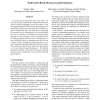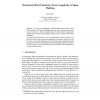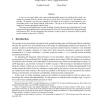6 search results - page 1 / 2 » Moderately Hard, Memory-Bound Functions |
104
click to vote
NDSS
2003
IEEE
15 years 7 months ago
2003
IEEE
A resource may be abused if its users incur little or no cost. For example, e-mail abuse is rampant because sending an e-mail has negligible cost for the sender. It has been sugge...
107
click to vote
FSTTCS
2003
Springer
15 years 7 months ago
2003
Springer
A key idea in cryptography is using hard functions in order to obtain secure schemes. The theory of hard functions (e.g. one-way functions) has been a great success story, and the ...
106
click to vote
TON
1998
15 years 1 months ago
1998
— This paper explores the variations in mean queue length for stationary arrival processes with the same mean and autocorrelation functions, or equivalently, the same mean and po...
107
click to vote
AFRICACRYPT
2008
Springer
15 years 4 months ago
2008
Springer
Proof-of-work schemes are economic measures to deter denial-of-service attacks: service requesters compute moderately hard functions the results of which are easy to check by the ...
101
click to vote
FOCS
2000
IEEE
15 years 6 months ago
2000
IEEE
A zap is a two-round, public coin witness-indistinguishable protocol in which the first round, consisting of a message from the verifier to the prover, can be fixed “once and...



